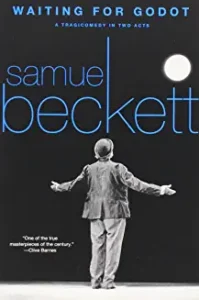Waiting for Godot: Tragicomedy in Two Acts by Samuel Beckett 1952
Perhaps one of the 20th C’s most recognizable titles, Beckett wrote this tragicomedy in 1948-49, shortly after the end of WWII in which he fought as a member of the French Resistance. Born in Dublin, he lived most of his life in Paris and has been hailed as the last of the Modernist writers. He was awarded the Nobel Prize in Literature in 1969 and died in 1989 at the age of 83.
Godot is an amazingly stark and apparently ‘simple’ story. Two men, Estragon and Vladimir, poorly dressed and apparently without jobs or families, are waiting for someone named Godot. Who Godot is and what he is supposed to do when they meet him remain unclear, though the inclusion of the letters of GOD cannot be a coincidence. The stage is empty except for a single tree. Two other characters, Pozzo and Lucky appear, the former leading the latter via a rope around his neck and abusing him as if he is a slave. A boy, announcing that Godot will not be coming today is the final player.
One critic described the play as follows: Beckett “has achieved a theoretical impossibility—a play in which nothing happens, that yet keeps audiences glued to their seats. What’s more, since the second act is a subtly different reprise of the first, he has written a play in which nothing happens, twice.” A perfect description for Estragon and Vladimir’s dialogue, an amazingly complex, repetitive, and beyond-belief intricate set of lines. The audience is left with Beckett’s pessimistic, dreary, and apparently hopeless view of man—our lives have no purpose and there’s not much we can do about it. Even a decision to end it all by hanging seems to be thwarted by the weakness of the tree and the short length of the rope. All we can do is show up again tomorrow and ‘wait for Godot’. Reminds me of the adage that ‘life sucks and then you die.” Ugh!
I read this play inspired by attending a performance by Bill Irwin, an accomplished actor and clown, in a show entitled ‘On Beckett’ which he wrote in 2017 and has performed all over the world since then In the play, Irwin read portions of Beckett’s short fiction and plays and performed his version of them. An inspiring performance and the re-introduction to this play which I hadn’t read for many years. Worth reading again, especially at this time of such grim news in the world. It won’t cheer you up, but it might provide some solace that you’re not alone in your situation.



